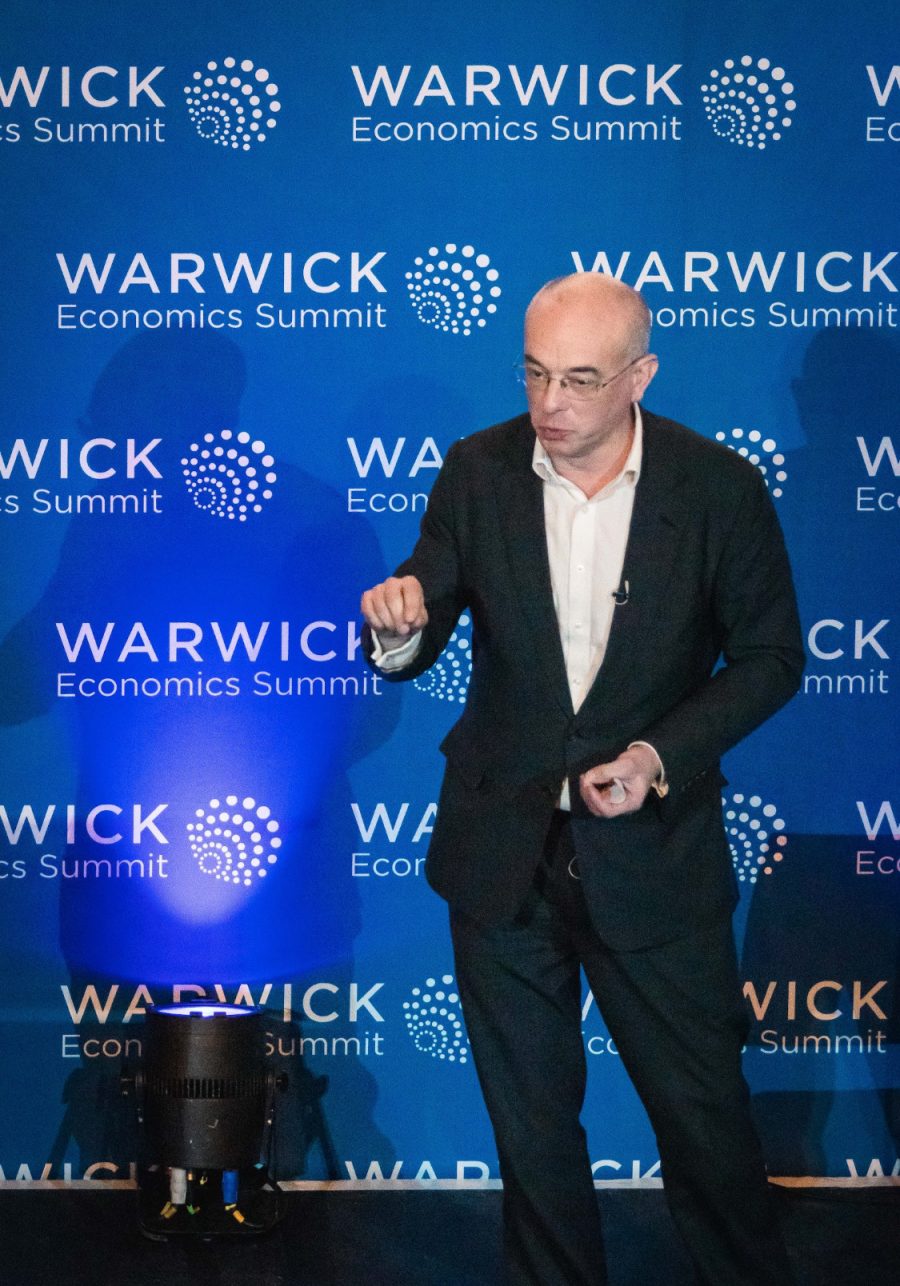Paul Donovan takes center stage at the Warwick Economic Summit 2025.
As the chief economist for UBS Global Wealth Management, the audience, mostly Economics students, expected to hear a panel focusing on financial markets and the implications for it in our current day. To perhaps the surprise of many of us in that lecture hall, we were taken aback by his choice of topic: Prejudice Politics and its correlation to Economic Success.
Donovan told a powerful story of the transition we’ve had in the fourth industrial revolution, gradually making strong eye contact with many of us in the hall as he transitioned into speaking about how many societies have negatively impacted their own economic success because of the underlying prejudice which still exists today. He stops for a moment, looks down and begins to tell us passionately about the beginning of his career, “I was in the closet twice. If I had admitted that I had gone to a state school, my career would have been severely damaged. If I had admitted that I’m gay, my career would have been over.”
His raw and authentic speech on his own experiences of navigating the corporate world in a time where his personal background would have been subject to prejudice was incredibly thought-provoking. It was a powerful reminder that many companies and institutions today still have yet to create an environment where people can openly be themselves. Donovan does, however, make a connection to the larger implications, making us question why some demographics are subject to prejudice in the first place.
He refers to the concept of “scapegoat economics”: when society and environments go through economic change, people start needing explanations. The simplest explanations often come from blaming certain demographics, regardless of whether they are closely connected or not. How people tend to blame specific groups regardless of relevance, is what scapegoat economics essentially is. Whether it be the LGBTQ+ community, women, immigrants, or any other group within society which is already under prejudice, they are often the target for being used as scapegoats to explain economic phenomena.
These uninformed and prejudiced perceptions that are formed over time affect economic success. It causes companies to make selections regarding their applicants on the basis of attributes and identity markers which have little correlation to their potential to be a productive employee. Donovan emphasizes that we have to get inclusion right. Despite many people now gaining a better understanding of the value that diversity and inclusion can bring, the way in which it is being implemented can be improved. He suggests that a quota system for the applicants for a job may not be nearly as important as having a more diverse interview panel, for example. This is just one example of how companies and institutions can make the active choice to create a more productive workforce. The most productive and efficient workforce seems to largely depend on the worker’s ability to be fully themselves and feel safe enough in their environment to produce good work.
To achieve this, there needs to be a significant number of changes made on several levels. Businesses and institutions, as well as us as Economics students, must work on fighting the discourse which suggests that minorities are solely responsible for any economic change that can be seen. We must also recognize that discrimination has become, in some ways, more difficult to see. It can be in many forms, including employers’ inability to see someone’s potential because of their own biases and preconceived notions of a specific group of people. We are responsible for regularly checking the hiring processes, ensuring that the demographics represented within a workforce are not skewed over time and consistently being open to accepting those from more diverse backgrounds, no matter how unfamiliar they may seem at the time. Finally, when a diverse and inclusive workforce has been successfully created, we must do everything in our power to sustain the environment that has been crafted so carefully.
Donovan emphasizes repeatedly throughout his talk that there will be no such thing as getting the right person for the right job at the right time. This is an ideal that we must learn to let go of and instead learn how to make the most out of the talent that already exists. When we allow society’s perceptions of identity to lead our decisions on economic productivity, we set ourselves back by an unimaginable amount. One of the final examples Donovan gave was of Alan Turing. Turing was a brilliant British mathematician and a major contributor to computer science in the early-to-mid-1900s. He was also gay and was later sentenced to death because of his homosexuality. A man so brilliant and considered one of the fathers of modern computer science was forced to end his life short because of a piece of his identity that society had deemed indecent. Turing’s death was a major loss for the world of computer science and we can now only imagine how things could have been different, should society have had a more open-minded view of his personal identity.
As Donovan puts it, “Prejudice politics does damage because it undermines the inclusivity and the diversity that are essential for economic success as we look ahead.” If we want to have the right person for the right job at the right time, we cannot continue the discrimination in the workforce. Diversity is not simply a buzzword; the success and sustainability of our society depend on our ability to make decisions that look beyond our own biases.
About the author, Tanishka Murthy: This year, I was selected to be the first ambassador from Bard College Berlin to the Warwick Economics Summit and took on the role of a student journalist as well. This was incredibly rewarding with multiple opportunities to speak with accomplished individuals in various fields and a chance to reflect on what we can do as students for a better future.

